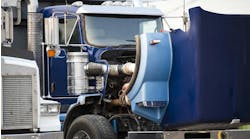Fleet managers must stay up to date with changes in federal regulations related to speed limiters, automatic emergency braking, the Department of Labor’s definition of “employee,” and many others. They are essential, as are a whole other set of regulatory changes at the state level.
Some state-level regulations have captured national attention, such as California’s Advance Clean Fleets requirements, which have trucking companies pondering how to operate with battery-powered trucks and limited recharging infrastructure. Other state-level regulations rank as more mundane. Speed limits, truck routes, fuel tax rates, truck registration fees, and toll road charges may all change at the state level. Often, changes in state laws and regulations go into effect on Jan. 1 of a new year.
Mundane or not, state regulations impact motor carrier safety and compliance. Commercial vehicle law enforcement officers routinely check truck registration and fuel tax compliance. Failing to adjust to new speed limits compromises safety for all drivers, professional or not.
See also: 2024 Regulations Roadmap: Part 1
How can fleet managers keep track of regulatory changes across all 50 U.S. states and the 10 Canadian provinces, not to mention the myriad local jurisdictions? Depending on the scope of your operations, it can be daunting. Here’s a quick guide to keep your operation safe and legal:
State truck registration fee levels: Contact your state Department of Motor Vehicles or the International Registration Plan.
State fuel tax levels: Contact your state fuel tax administrator (department of revenue or finance) or the International Fuel Tax Agreement.
State speed limits: Contact your state transportation department or any of several websites that monitor truck speed limits, such as the Insurance Institute for Highway Safety, J.J. Keller, or your state trucking association. Weather, traffic, and road conditions dictate the safe speed, and road maintenance/construction activity may limit the legal maximum speed on any road.
State truck routes: Contact the state transportation department for questions about any routing changes. If you have a terminal network, your local terminal manager can secure relevant details. As with truck speed limits, road maintenance, and construction activity may affect truck routes.
Toll road charges: Contact the toll roads/turnpikes where you operate, the electronic toll payment provider your company utilizes, such as PrePass Tolls or an online truck toll calculator. Remember that truck tolls can differ by time of day, truck combination type, length, and height.
If your company belongs to a state trucking association, the American Trucking Associations, or the Owner-Operator Independent Drivers Association, all employ professionals that are always ready to help answer your questions.
Another option is to contact your friendly state trooper. When I served with the California Highway Patrol, I appreciated receiving calls from safety-conscious fleet managers asking, “What’s new this year?” I could recite the state-level regulatory changes and add practical advice: “If you’re heading north on U.S. 99 through Fresno, watch out for the shopping center construction. We’re really slowing trucks down there.” Safety and compliance are essential to everyone in trucking.
Steve Vaughn is senior vice president of field operations at PrePass Safety Alliance, the provider of PrePass weigh station bypass and electronic toll-payment and management services. Vaughn served nearly three decades with the California Highway Patrol and is a past president of the Commercial Vehicle Safety Alliance.



